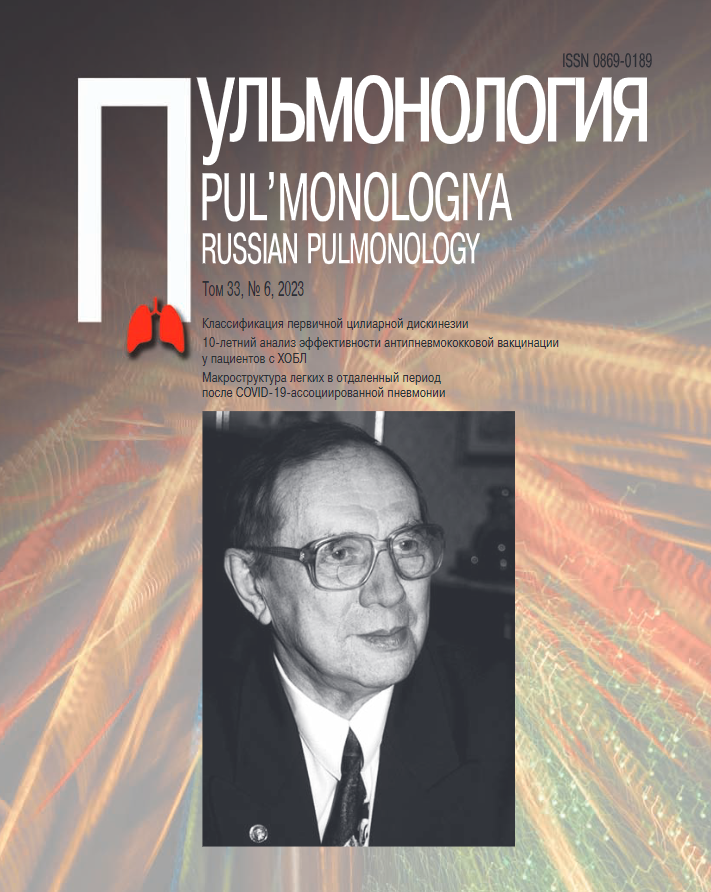
Russian pulmonologists have published 10 years of clinical experience in using Prevenar® 13 pneumococcal vaccine in patients with COPD

The results of a 10-year study of the effectiveness of the Prevenar® 13 vaccine in patients with chronic obstructive pulmonary disease (COPD) were published in the scientific and practical journal Pulmonology[1] at the end of 2023.
Pneumococcus, as a pathogen, ranks third in the world among all infectious diseases[2] and not only threatens to develop serious consequences for the body, but also worsens the survival prognosis of patients with existing chronic diseases, including COPD.
Annual mortality from COPD worldwide is 42.5 per 100 thousand population[3], ranking 3rd among the leading causes of death in the world[4],[5]. 2.4 million people are registered with COPD in Russia[6]. According to the Federal State Statistics Service of the Ministry of Economic Development of the Russian Federation, the annual mortality rate from COPD is currently 7—10.2%[7].
Patients with COPD regularly experience concomitant exacerbations and death due to the severe disease course. In addition, a weakened immune system significantly increases the risk of contracting pneumococcal infection. The development of community-acquired pneumonia is a global problem.
Vaccination is the only way to significantly affect the morbidity and mortality from pneumococcal infection. Russian scientists from Chelyabinsk conducted a large-scale analysis of the prospective clinical effectiveness of the Prevenar® 13 vaccine in 362 male patients with COPD over 10 years from 2012 to 2022[1].
Patients from the group vaccinated with Prevenar® 13, like the control group (unvaccinated patients), experienced severe disease and frequent exacerbations. However, survival was 20% higher in the vaccine group (47% vs. 27%, respectively). In addition, patients in the control group noted a progression of dyspnea by 12% by 2022, which was not recorded in the Prevenar® 13 group.
It was proven that the use of Prevenar® 13 reduced mortality rates by 3.8 times by lowering inflammation in the respiratory tract, decreased the incidence of pneumonia during COPD by 6.2 times, and also reduced the incidence of exacerbations of COPD by 3 times.
Thus, vaccination with the 13-valent polysaccharide conjugated vaccine Prevenar® 13 in the long-term perspective helps stabilize the respiratory system parameters in patients with COPD, maintaining a low level of adverse effects, increasing the survival of such patients and reducing the number of hospitalizations by 3.6 times. With vaccination, an increase in patient survival over a 10-year horizon was noted.
For pneumococcal infection control in Russia, the manufacture of the 13-valent polysaccharide conjugated vaccine Prevenar® 13 has been localized at the Petrovax production complex in the Moscow Region. The vaccine is manufactured by Petrovax, utilizing a full-cycle FDF[8] production technique, in cooperation with Pfizer.
1 https://journal.pulmonology.ru/pulm/article/view/4369/3579
2 GBD 2019 Antimicrobial Resistance Collaborators. Lancet 2022
3 Global Initiative Lung Disease. Global Strategy for Prevention, Diagnosis and Management of Chronic Obstructive Lung Disease: 2023 Report. Available at: https://goldcopd.org/2023-gold-report-2/
4 Richie R.C. Morbidity and mortality associated with chronic obstructive pulmonary disease (COPD). J. Insur. Med. 2023; 49 (4): 230–243. DOI: 10.17849/insm-49-04-230-243.1.
5 https://pulmonology-fmba.ru/institute/novosti/15-noyabrya-2023-vsemirnyy-den-borby-protiv-khobl/
6 A.G. Chuchalin, S.N. Avdeev, Z.R. Aisanov and etc. Chronic obstructive pulmonary disease: federal clinical guidelines for diagnosis and treatment. Pulmonology. 2022; 32 (3): 356–392. DOI: 10.18093/0869-0189-2022-32-3-356-392.
7 https://journal.pulmonology.ru/pulm/article/view/4369/3579
8 FDF stands for finished dosage form


